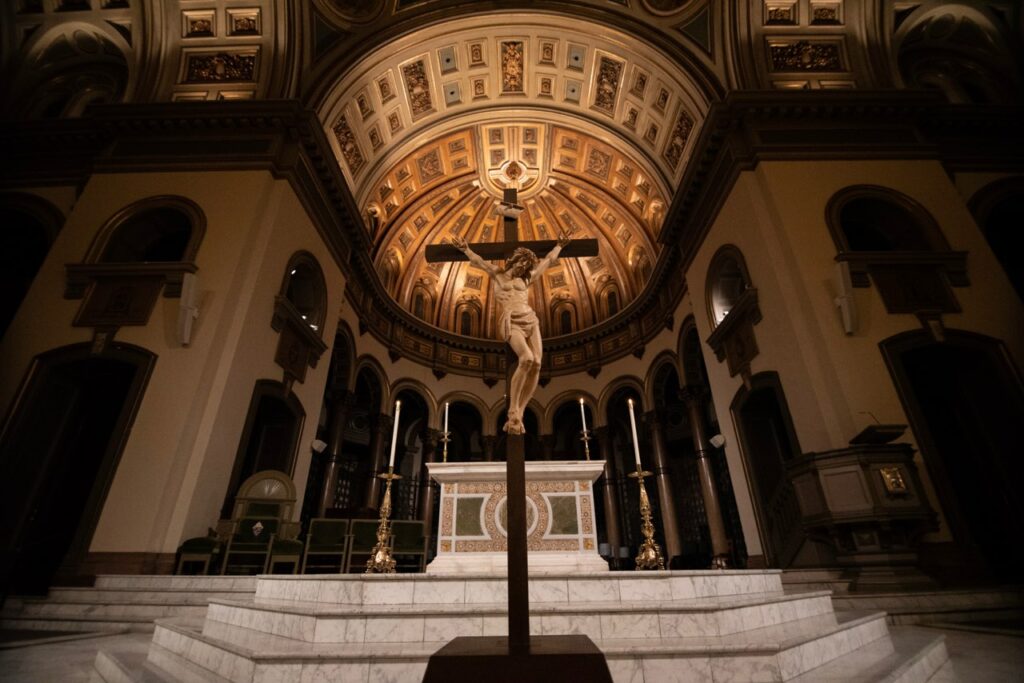Editor’s Note: On May 14, 2020, local leaders of the City of Richmond and the County of Accomack requested a two-week delay to enter Phase One, Governor Northam amended Executive Order 62 to delay reopening of these jurisdictions until Friday, May 29, 2020.
As a result of this new information and for the safety of all, Bishop Knestout is directing all parishes located in the City of Richmond and the County of Accomack to delay moving to Phase 1 Reopening until the Sunday Vigil Mass on Saturday, May 30, 2020. This includes delaying offering public Masses.
Exercising precautions, parishes will welcome congregations May 23-24
Beginning the weekend of May 23-24, the Catholic faithful of the Diocese of Richmond will again be celebrating Masses in their parish churches.
Per Gov. Ralph Northam’s Executive Order 61, places of worship may have services for up to 50% of the lowest occupancy load on the certificate of occupancy of the room or facility in which the Mass is celebrated.
Included in an updated “Emergency Preparedness Instruction Manual” are details about how Masses are to be celebrated. It details precautions to which parishes must adhere, including social distancing and the wearing of masks by all congregants ages 3 and older.
The manual, written by the diocesan Office of Preparedness, was sent to priests, deacons, seminarians, principals, campus ministers and lay leaders on Wednesday, May 13 and reviewed at a webinar that day.
Dispensation from obligation continues
While the celebration of Masses has resumed, Bishop Barry C. Knestout continues to dispense “all of the faithful of the Diocese of Richmond from the obligation to attend Mass on Sundays and holy days until further notice.”
The dispensation is due to the capacity limit for liturgies which is reducing the number of congregants and recognizing that those who have been categorized as “vulnerable,” i.e., anyone 65 and older and those who are immunocompromised, should remain at home.
“Parishes should continue livestreaming/recording Mass for the faithful unable to attend, e.g., those in a vulnerable category,” the document stated.
However, those in the vulnerable category are not prohibited from attending Mass. According to the guidelines, “In light of many parish communities having a large number of parishioners in a vulnerable category, when establishing adjusted Mass times, parishes may wish to consider a Mass time designated/reserved for those in a vulnerable category.”
Mass times
The guidelines stipulate that “if/when more than one Mass occurs on a given day, there must be, at minimum, three hours between the start time of each Mass,” e.g., 8 a.m. and 11 a.m.; 9:15 a.m. and 12:15 p.m.
It continues, “This allows for people to arrive and be seated, the Mass to be celebrated, receipt of Communion (which may take longer than normal due to social distancing requirements), the people to depart the building through the appropriate exit, the church and restrooms to be cleaned and disinfected prior to the next Mass, and avoid possible interaction of the faithful leaving/arriving at a Mass in an effort to maintain indoor capacity percentages.”
Due to capacity limitations in worship spaces, parishes will need to devise a system for inviting parishioners to attend Mass. Among the possibilities for a particular Mass are alphabetically; by envelope number or via online sign-up.
Once invited, parishioners will be advised to arrive 30 minutes prior to the start of Mass so they can be ushered to their seats.
Receiving the Eucharist
Only the priest and deacon, each wearing a mask, will distribute Communion at Masses. Communicants receiving the Eucharist in their hands will come forward wearing their masks, will receive the host, step aside, lift their face covering, consume the host, replace the face covering and return to their seat.
Since the CDC and WHO have recommended against distributing and receiving Communion on the tongue, the manual states, “In response to the divine law to love our brothers and sisters, and out of special concern for the vulnerable and the priest/deacon, communicants who normally receive on the tongue are respectfully asked to make a sacrifice of personal preference. They are asked to prayerfully consider the reverent act of receiving in the hand, which practice is attested in our Catholic Tradition since the ancient Church.”
Other stipulations
The manual, which also includes directives previously put in place, also notes:
• Because social distancing is still in effect and due to the small size of many of the adoration chapels in the diocese, the Blessed Sacrament should continue to be secured in the tabernacle in the larger main body of the church so that social distancing can be maintained for private prayer.
• While use of a choir is suspended and singing by the assembly is discouraged, a cantor and one musician may be present. “It has been demonstrated that singing can increase the spread of the virus,” according to the manual.
• Parishes are to suppress the passing of baskets for the offertory collection. They can place the baskets at the front of the church for the faithful to place their offertory in immediately before stepping forward to receive Communion or have an usher hold a basket into which people can place their offertory as they depart the church.
• Baptismal and holy water fonts are to remain empty until further notice.
• All parishes should remain open during normal operating hours. If hours must be adjusted, the pastor should ensure this is communicated to parishioners. Either the pastor or a designated staff member should ensure that the phone is answered and email is responded to in a timely manner.
Editor’s note: Those with questions regarding the reopening of churches for the celebration of public Masses should contact their parishes or email [email protected].

